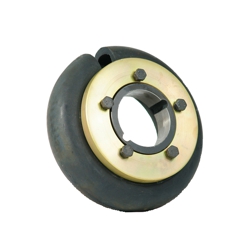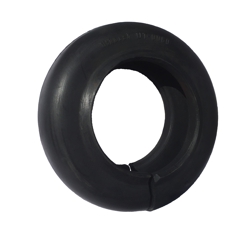Tyre Coupling
Welcome to your premier destination for high-quality tyre coupling solutions in Australia. As a trusted division of Naismith Engineering & Manufacturing Co Pty Ltd, with over 75 years of experience in the power transmission industry, we offer an extensive range of tyre type coupling products to meet all your mechanical needs.
Read More
Rubber Tyre Coupling
Rubber tyre coupling, also known as tyre flex coupling, is a popular choice in various industrial applications due to its unique design and performance characteristics. These couplings consist of two metal hubs connected by a flexible rubber element shaped like a tyre, hence the name.
Key features of rubber tyre coupling include:
- Excellent Shock Absorption: The rubber element effectively absorbs shock loads and vibrations, protecting connected equipment from damage.
- High Misalignment Tolerance: Tyre couplings can accommodate significant angular, parallel, and axial misalignment between shafts.
- Torsional Flexibility: The rubber element provides torsional flexibility, reducing stress on connected machinery during start-ups and load fluctuations.
- Electrical Insulation: The rubber element acts as an electrical insulator between the connected shafts.
- Maintenance-Free Operation: These couplings typically require no lubrication, reducing maintenance needs.
- Wide Range of Sizes: Available in various sizes to suit different shaft diameters and torque requirements.
- Temperature Resistance: High-quality rubber compounds used in these couplings can withstand a wide range of operating temperatures.
- Chemical Resistance: Depending on the rubber compound used, these couplings can resist various chemicals and environmental factors.
- Cost-Effective: Tyre couplings offer reliable performance at a competitive price point, making them a cost-effective choice for many applications.
Our range of rubber tyre coupling products includes various sizes and configurations to suit different industrial needs. Whether you're looking for a standard tyre coupling or a custom solution, our extensive inventory and global sourcing capabilities ensure we can meet your requirements.
Factors to Consider When Choosing Tyre Coupling
Selecting the right tyre coupling for your application is crucial for optimal performance and longevity. Here are some key factors to consider:
- Torque Requirements: Determine the maximum torque your application needs to transmit. Choose a coupling with a torque capacity that exceeds your maximum requirement.
- Shaft Sizes: Measure the diameters of the shafts to be connected. Our catalogue includes couplings for various shaft sizes.
- Misalignment: Consider the potential misalignment between shafts. While tyre couplings can handle significant misalignment, severe cases may require special considerations.
- Operating Speed: Check the maximum operating speed of the coupling and ensure it meets or exceeds your application's requirements.
- Environmental Conditions: Consider factors like temperature, exposure to chemicals, or presence of dust. These can influence the choice of rubber compound for the tyre element.
- Space Constraints: Measure the available space for the coupling. Tyre couplings typically require more radial space than some other coupling types.
- Shock Loads: If your application involves frequent start-stops or sudden load changes, the shock-absorbing properties of tyre couplings can be particularly beneficial.
- Vibration Damping: Consider the level of vibration in your system. Tyre couplings excel at damping vibrations, which can be crucial for some applications.
- Maintenance Requirements: While generally low-maintenance, consider how often you can perform inspections and potential replacements.
- Cost Considerations: While initial price is important, also consider long-term factors like durability and potential energy savings from improved system efficiency.
Our team of experts is always ready to help you navigate these factors and choose the perfect tyre type coupling for your specific needs.
Learn More
Understanding the importance of choosing the right tyre coupling is crucial for the efficiency and longevity of your machinery. Here are some additional points to consider:
- Applications: Tyre couplings are commonly used in various industries, including mining, oil and gas, power generation, and general industrial machinery. They're particularly well-suited for applications involving electric motors, pumps, compressors, and gearboxes.
- Advantages Over Other Coupling Types: Compared to some other flexible couplings, tyre couplings often offer superior shock absorption and misalignment capacity. They can also operate at higher speeds than many gear or chain couplings.
- Installation Tips: Proper installation is crucial for the performance and lifespan of your tyre coupling. Ensure shafts are correctly aligned, and the coupling is not compressed or stretched axially when installed.
- Maintenance and Inspection: While generally low-maintenance, regular visual inspections can help detect any signs of wear or damage to the rubber element. Look for cracks, chunks missing from the rubber, or any unusual deformation.
- Customisation Options: In addition to our standard range, we can provide custom tyre couplings tailored to your specific requirements. This might include special rubber compounds for extreme temperatures or chemical exposure, or unique hub designs for non-standard shaft configurations.
- Energy Efficiency: The flexibility of tyre couplings can contribute to overall system efficiency by reducing the energy lost to vibration and misalignment.
- Safety Considerations: In applications where coupling failure could pose safety risks, consider implementing a monitoring system or regular inspection schedule.
- Replacement and Upgrades: When it's time to replace your coupling, it's a good opportunity to reassess your needs. Our team can help you determine if a different size or model might better suit your current requirements.
Our knowledgeable team is always ready to provide more information and guide you in selecting the right rubber tyre coupling for your specific needs. With our extensive inventory, same-day dispatch, and expert advice, you can trust us to keep your operations running smoothly and efficiently.
FAQs
What are the main advantages of tyre couplings?
The main advantages of tyre coupling include excellent shock absorption, high misalignment tolerance, torsional flexibility, and maintenance-free operation. They're also cost-effective and provide electrical insulation between shafts.
How do I choose the right size tyre coupling?
Choosing the right size depends on several factors, including the torque to be transmitted, shaft sizes, operating speed, and misalignment requirements. Our team can help you calculate the appropriate size based on these factors.
Are tyre couplings suitable for high-speed applications?
While tyre type coupling can handle moderate to high speeds, there are upper limits based on the coupling size and design. For very high-speed applications, we might recommend alternative coupling types. Contact our team for recommendations based on your specific speed requirements.
How often should tyre couplings be replaced?
The lifespan of a rubber tyre coupling depends on the application and operating conditions. Regular visual inspections can help determine when replacement is necessary. Look for signs of wear, cracking, or deformation in the rubber element.
Can tyre couplings be used in outdoor or harsh environments?
Yes, tyre couplings can be suitable for outdoor and harsh environments. We offer couplings with rubber elements designed to withstand various environmental conditions, including extreme temperatures and exposure to chemicals or UV radiation.




